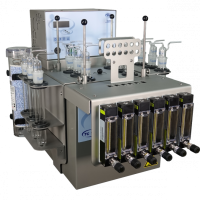
Oxidation stability of mineral insulating oil (ASTM D2440)
The oxidation stability test of mineral transformer oils is a method for assessing the amount of sludge and acid formed in a transformer oil when the oil is tested under prescribed conditions. Good oxidation stability is necessary to improve the service life of the oil. Oils that meet the requirements tend to minimize electrical conduction, ensure acceptable heat transfer, and preserve system life.
For this test, a test specimen of mineral insulating oil is placed in an oil receptable together with a copper catalyst coil to simulate the ageing of the sample. The sample is in the bath at 110°C for 72 or 164 hours. During this time, oxygen is constantly bubbled through the sample. After this procedure, the oil is evaluated by measuring the amount of sludge and acids formed.
Primary benefits of Tamson D2440 apparatus
- Up to six positions
- Drain valve to safely empty bath oil
- Grommets to protect glassware
- Overflow outlet and float to ensure correct filling level
- Levelling platform to position glassware to required depth
- Separate opening in cover to add bath oil
- Robust and well insulated bath
- Bath is equipped with six calibrated flowmeters
- Dryer tower included, which is mounted on the bath
- Thermometer opening in cover
- Stainless steel bath and cover (easy to clean)
- Optional six additional pieces of glassware can be placed in the standard supplied brackets to reduce smell in case apparatus is not placed in fume hood
- Bath can also be used as circulator to pump bath fluid to an external application
Range: Ambient .. 250 °C / 482°F
Reading: °C (°F on request)
Stability: 0,02°C
Heating: 1,4 kW
Bath Volume: 16L
Bath openings: 6mm
Bath depth: 220mm
Dimensions (L x W x H): 480 x 550 x480 mm
Materials: stainless steel 304, brass
